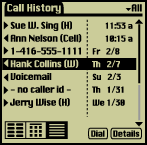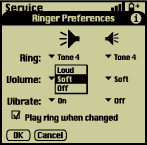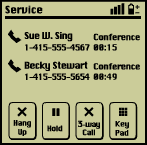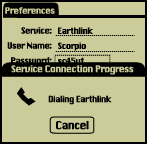 The
call history lets you store up to 1000 past calls and lets you know when
you called someone, allowing you to track your calls more effectively.
The
call history lets you store up to 1000 past calls and lets you know when
you called someone, allowing you to track your calls more effectively.
 The
VisorPhone has its own Li-Ion battery that provides 3 hours of talk time
or 72 hours of standby time, and it also has multiple ring settings and
a silent vibrating ring for those annoying people in the movie theater.
The
VisorPhone has its own Li-Ion battery that provides 3 hours of talk time
or 72 hours of standby time, and it also has multiple ring settings and
a silent vibrating ring for those annoying people in the movie theater. You can also adjust the ring setting using a physical slider control on
the module.
You can also adjust the ring setting using a physical slider control on
the module.
 One
cool thing that GSM allows you to do is send Short Message Service (SMS)
messages to other SMS users. This has made GSM very popular in the
rest of the world, and I think it will take off here in the U.S. as well.
Sometimes you just want to send a quick note to someone and not have to
call them. SMS allows you to do that, and with canned messages similar
to the @ctiveLink,
there is less text that you'll need to write.
One
cool thing that GSM allows you to do is send Short Message Service (SMS)
messages to other SMS users. This has made GSM very popular in the
rest of the world, and I think it will take off here in the U.S. as well.
Sometimes you just want to send a quick note to someone and not have to
call them. SMS allows you to do that, and with canned messages similar
to the @ctiveLink,
there is less text that you'll need to write.
 Other
features of the VisorPhone include easier 3-way calling and the ability
to use the VisorPhone as a modem. The VisorPhone supports up to 14.4
Kbps, but many U.S. service providers top out at 9600 Kbps.
Other
features of the VisorPhone include easier 3-way calling and the ability
to use the VisorPhone as a modem. The VisorPhone supports up to 14.4
Kbps, but many U.S. service providers top out at 9600 Kbps.
 I
think that the SMS and modem functionality of the VisorPhone will appeal
to users, as it gives the module extra functionality for your money.
At $299, the VisorPhone is a pretty big investment, but if you take into
consideration the fact that you get an advanced cell phone that integrates
with the visor, as well as the equivalent of 2-way messaging and a modem,
the VisorPhone becomes a better deal. For those who cannot effectively
use GSM, AirPrime is making a CDMA
module with many of the features of the VisorPhone.
I
think that the SMS and modem functionality of the VisorPhone will appeal
to users, as it gives the module extra functionality for your money.
At $299, the VisorPhone is a pretty big investment, but if you take into
consideration the fact that you get an advanced cell phone that integrates
with the visor, as well as the equivalent of 2-way messaging and a modem,
the VisorPhone becomes a better deal. For those who cannot effectively
use GSM, AirPrime is making a CDMA
module with many of the features of the VisorPhone.
The VisorPhone is expected to be available November 2000. We'll
have a review of the module as soon as we can.